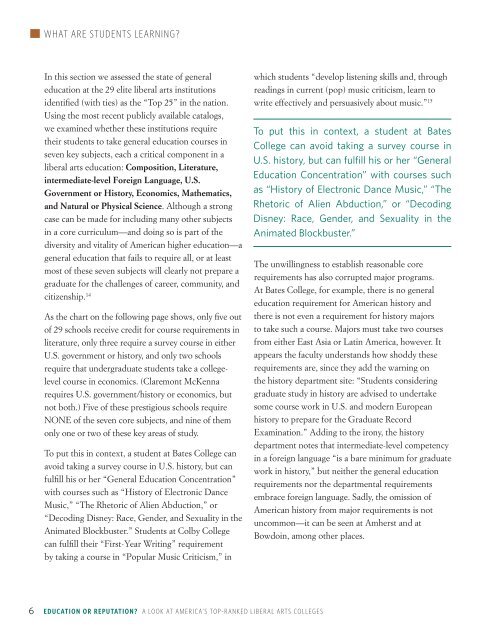k4yqkhk
k4yqkhk
k4yqkhk
Create successful ePaper yourself
Turn your PDF publications into a flip-book with our unique Google optimized e-Paper software.
WHAT ARE STUDENTS LEARNING?In this section we assessed the state of generaleducation at the 29 elite liberal arts institutionsidentified (with ties) as the “Top 25” in the nation.Using the most recent publicly available catalogs,we examined whether these institutions requiretheir students to take general education courses inseven key subjects, each a critical component in aliberal arts education: Composition, Literature,intermediate-level Foreign Language, U.S.Government or History, Economics, Mathematics,and Natural or Physical Science. Although a strongcase can be made for including many other subjectsin a core curriculum—and doing so is part of thediversity and vitality of American higher education—ageneral education that fails to require all, or at leastmost of these seven subjects will clearly not prepare agraduate for the challenges of career, community, andcitizenship. 14As the chart on the following page shows, only five outof 29 schools receive credit for course requirements inliterature, only three require a survey course in eitherU.S. government or history, and only two schoolsrequire that undergraduate students take a collegelevelcourse in economics. (Claremont McKennarequires U.S. government/history or economics, butnot both.) Five of these prestigious schools requireNONE of the seven core subjects, and nine of themonly one or two of these key areas of study.To put this in context, a student at Bates College canavoid taking a survey course in U.S. history, but canfulfill his or her “General Education Concentration”with courses such as “History of Electronic DanceMusic,” “The Rhetoric of Alien Abduction,” or“Decoding Disney: Race, Gender, and Sexuality in theAnimated Blockbuster.” Students at Colby Collegecan fulfill their “First-Year Writing” requirementby taking a course in “Popular Music Criticism,” inwhich students “develop listening skills and, throughreadings in current (pop) music criticism, learn towrite effectively and persuasively about music.” 15To put this in context, a student at BatesCollege can avoid taking a survey course inU.S. history, but can fulfill his or her “GeneralEducation Concentration” with courses suchas “History of Electronic Dance Music,” “TheRhetoric of Alien Abduction,” or “DecodingDisney: Race, Gender, and Sexuality in theAnimated Blockbuster.”The unwillingness to establish reasonable corerequirements has also corrupted major programs.At Bates College, for example, there is no generaleducation requirement for American history andthere is not even a requirement for history majorsto take such a course. Majors must take two coursesfrom either East Asia or Latin America, however. Itappears the faculty understands how shoddy theserequirements are, since they add the warning onthe history department site: “Students consideringgraduate study in history are advised to undertakesome course work in U.S. and modern Europeanhistory to prepare for the Graduate RecordExamination.” Adding to the irony, the historydepartment notes that intermediate-level competencyin a foreign language “is a bare minimum for graduatework in history,” but neither the general educationrequirements nor the departmental requirementsembrace foreign language. Sadly, the omission ofAmerican history from major requirements is notuncommon—it can be seen at Amherst and atBowdoin, among other places.6 EDUCATION OR REPUTATION? A look at America’s Top-raNKed Liberal Arts COLLEGES


